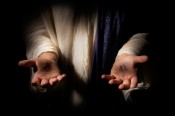In 1847, a French poet was asked by a clergyman to write a poem for Christmas mass. Using the gospel of Luke as his guide, he imagined witnessing the birth of Jesus in Bethlehem. “Cantique de Noel” was the product of his inspiration.
His poem very soon became a song, as the writer commissioned his musician friend to compose music to accompany his poem. The song was performed just three weeks later at a Midnight Mass on Christmas Eve.
A decade later, an American writer caught wind of it and brought it to an entirely new audience halfway around the world.
Here are the lyrics to this highly favored anthem:
O holy night! The stars are brightly shining,
It is the night of the dear Saviour’s birth.
Long lay the world in sin and error pining,
Till He appeared and the Spirit felt its worth.
A thrill of hope the weary world rejoices,
For yonder breaks a new and glorious morn.
Fall on your knees! Oh, hear the angel voices!
O night divine, the night when Christ was born;
O night, O holy night, O night divine!
O night, O holy night, O night divine!
Led by the light of faith serenely beaming,
With glowing hearts by His cradle we stand.
O’er the world a star is sweetly gleaming,
Now come the wisemen from out of the Orient land.
The King of kings lay thus lowly manger;
In all our trials born to be our friends.
He knows our need, our weakness is no stranger,
Behold your King! Before him lowly bend!
Behold your King! Before him lowly bend!
Truly He taught us to love one another,
His law is love and His gospel is peace.
Chains he shall break, for the slave is our brother.
And in his name all oppression shall cease.
Sweet hymns of joy in grateful chorus raise we,
With all our hearts we praise His holy name.
Christ is the Lord! Then ever, ever praise we,
His power and glory ever more proclaim!
His power and glory ever more proclaim!
Our Need for a Savior
Notice the progression of the song. It begins with a description of the sinful world in need of a Savior within the first verse:
Long lay the world in sin and error pining,
Till He appeared and the Spirit felt its worth.
From the initial fall of man to Sodom and Gomorrah to the rebellion of the Israelites, The need for a Savior was pressing. And so God sent His Son to bear the burdens of those who would rebel against Him, or sin, for the rest of history.
His Relevance Through Humanity
The second verse speaks to some of the attributes of Christ – the friendship He offers, and His ability to identify with us, as He was God wrapped in flesh.
In all our trials born to be our friends.
He knows our need, our weakness is no stranger,
John 1:14 says, “And the Word became flesh, and dwelt among us, and we saw His glory, glory as of the only begotten from the Father, full of grace and truth.” Jesus can relate to us, since came not only as fully God, but fully man. He faced temptation, rejection, and endured physical pain on the cross. This truth is worthy of meditation any moment of any day, not just during the Christmas season.
How We Should Live
The third verse charges us to live in a way that is holy and pleasing to God. This is also an interesting part of the song, historically, given the era in which it was penned. Slavery was running rampant during the mid 1800s. Dwight, the American writer who brought this song to us from overseas, was stirred by this particular portion of the verse:
Truly he taught us to love one another,
His law is love and his gospel is peace.
Chains shall he break, for the slave is our brother
And in his name all oppression shall cease.
As a fervent abolitionist, Dwight’s view of slavery in the South was reflected in these words. His English translation of “O Holy Night” became popular in America, particularly among Northerners during the Civil War.
Jesus told us in John 13:35, “By this all men will know that you are My disciples, if you have love for one another.” Our love for one another is so important to Jesus that he even made His second greatest commandment (Matthew 22:39), after the commandment to love God (Matthew 22:37).
Jesus didn’t come to the world only to save us from eternity in hell. He came so that we could live abundantly here on earth, seeing our salvation at work in our day-to-day life and glorifying Him in the process. Parts of that process are loving God, loving one another and “be(ing) holy, for (He) is holy.” (1 Peter 1:16)
All Scripture references are taken from the New American Standard Bible.

